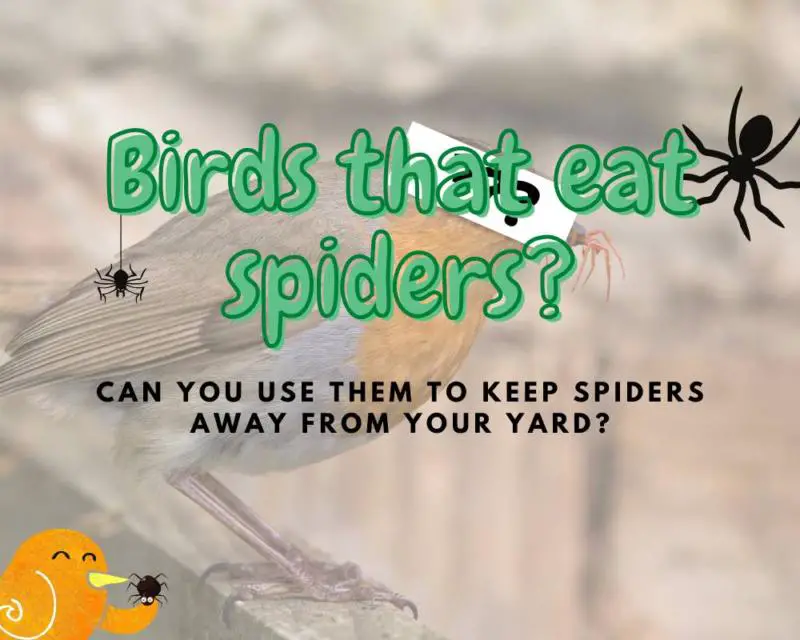While many people hate spiders, thinking that they’re gross and creepy, many birds actually like (to eat) them!
But which birds eat spiders? How do you attract spider-eating birds to your backyard to do the dirty work for you? Read on to find out everything you need to know about which birds eat spiders.
Many species of birds eat spiders occasionally. These include the insect-eating, omnivorous bird species in particular such as owls, pigeons, finches, ravens, jays, and sparrows but also chickens and starlings are common backyard birds that may indulge in spiders.
Spiders can be unwanted pests in your garden and they can even be dangerous. It can be tough to try and get rid of all the spiders in your yard on your own.
Luckily, there might be some local wildlife that can help you clean the yard!
Contents
Do owls eat spiders?
Yes, owls certainly eat spiders. In fact, they eat many kinds of insects. Smaller owls, such as scops and screech owls are the best for getting rid of spiders, as it is their diets that mostly consist of insects like spiders.
Owls are rather large, so they can eat spiders of all sizes and types, and they will.
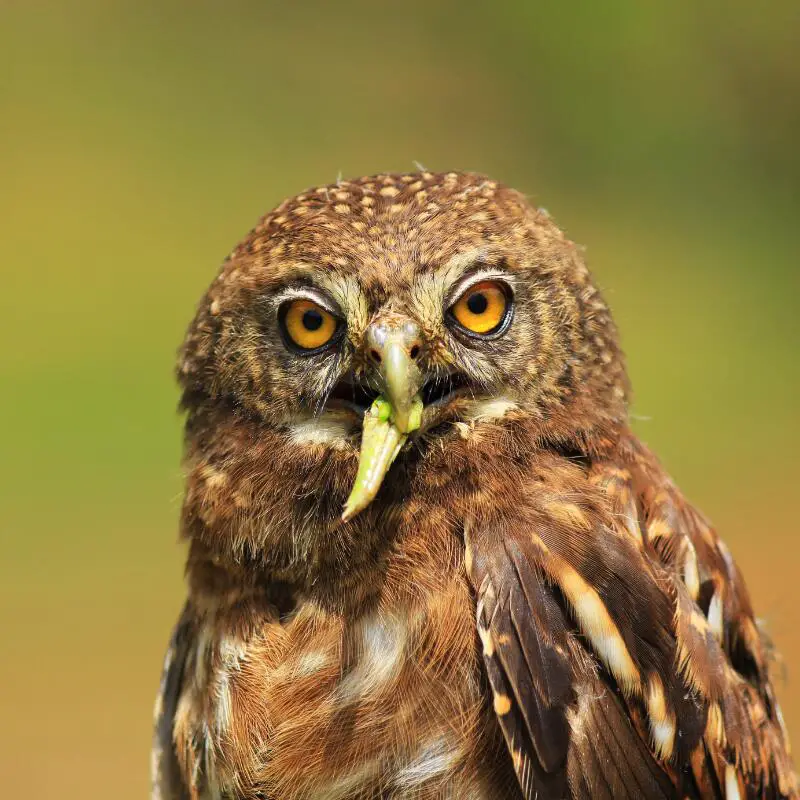
Owls are opportunistic hunters, and will pretty much eat anything they come across, provided they can catch it. This makes them fantastic for hunting all kinds of spiders in your backyard.
Do hawks eat spiders?
Insects are a part of the hawk’s diet, but not a major one. Hawks tend to hunt larger game like snakes, rodents, and even other birds. Spiders can often be quite small or be in crevises and corners that hawks can’t quite reach.
For this reason, although a hawk would eat a spider if it found one, I wouldn’t consider hawks a great bird to have around for getting rid of spiders.
Not only are they not terrifically effective at finding and eating the spiders, but they can also be a danger to other birds who would be better suited for the job.
Find out more about what hawks eat in my recent post!
Do pigeons eat spiders?
Pigeons are omnivores, meaning they eat both animals such as insects as well as plant life, seeds, and other non-animal foods.
Able to adapt to many environments and quite the opportunistic hunter, pigeons will eat almost anything that their small bodies can digest. This would include spiders.
Since pigeons are small and won’t bug other birds very much, they are an ideal candidate for cleaning the spiders out of your yard.
However, pigeons are rather small, so they are better for eating smaller spiders.
Do robins eat spiders?
Robins love eating insects and other bugs and will scoop up and eat worms, flies, snails, and certainly spiders as well.
Whereas we use the word “insects” and “bugs” interchangeably and about spiders here – spiders are actually not insects!
Bugs make up almost half of a robin’s diet, meaning if you’ve got a lot of spiders around your yard, a robin will definitely seek them out for a tasty lunch!
Robins have been known to eat foods from outside of their core diets as well and will eat many different kinds of bugs and plants in order to get the nutrients they need.
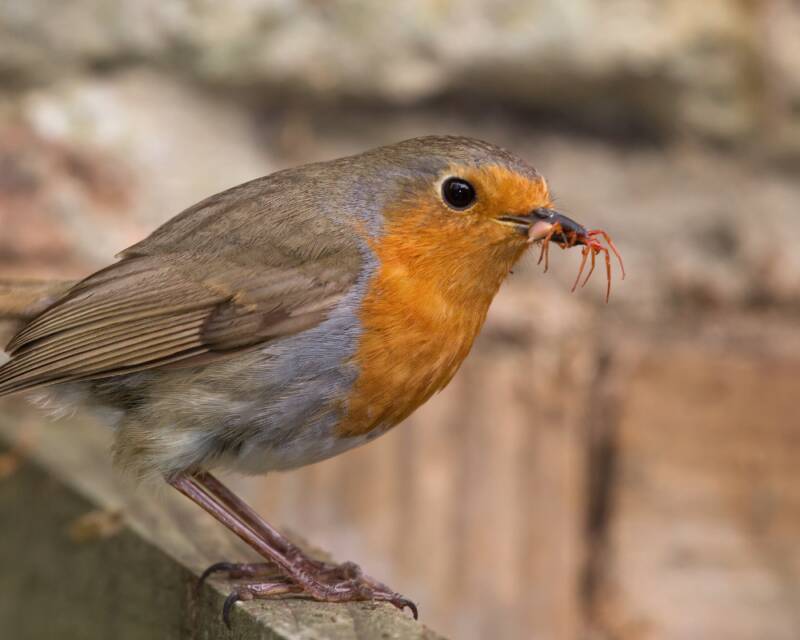
If you have issues with other bugs, attracting robins to your yard could be a good solution as well.
On the other hand, if you only want to get rid of spiders, robins could get distracted by other sources of food in your yard.
Do finches eat spiders?
Finches, much like pigeons, are omnivorous birds whose diet is very much determined by what they can find around them.
Though they prefer to feast on seeds, berries, and other plant life, finches have been known to eat insects and spiders as well.
As a smaller bird, finches are better for eating smaller spiders as well.
Since they love seeds, berries, and other plant life so much, finches aren’t always the most effective at hunting spiders specifically. That being said, if you can attract finches, they will certainly be helpful in partially culling your spider problem.
The most common backyard finch in the US is the House Finch, which you can easily attract to your backyard with sunflower or thistle seeds in a hopper or tube feeder.
Do sparrows eat spiders?
Sparrows, much like finches, robins, and pigeons, will eat spiders if they are an easy source of food in the area. Also much like these other birds, they prefer smaller spiders that they can easily catch and digest.
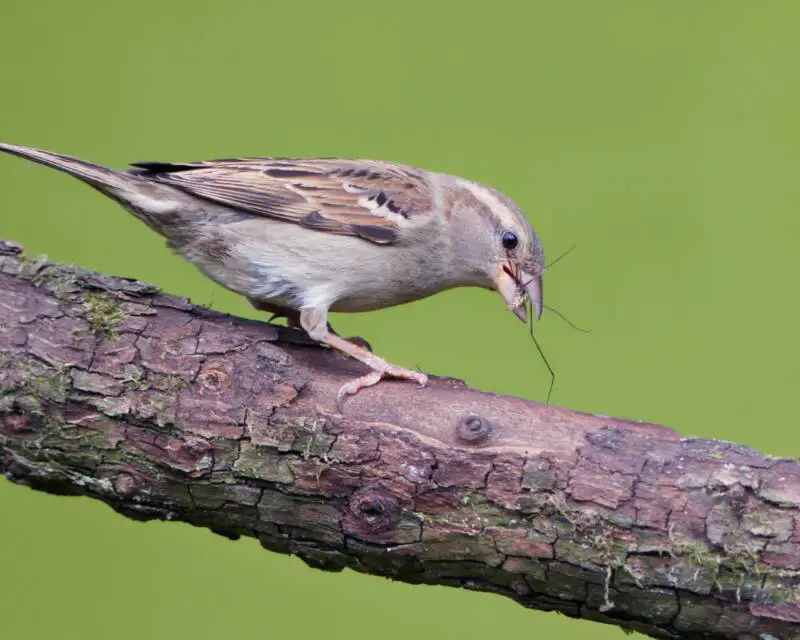
Sparrows prefer seeds and berries, though, and most of their feeding on insects actually comes into play when they are catching insects to feed to their young. Still, if you have sparrows in your yard, they will help with your spider issue.
Do geese eat spiders?
Geese do not eat spiders. Unlike most waterfowl, geese get their food on land. However, they are herbivores and don’t really eat insects, preferring instead to eat plants, seeds, and other plant life.
Geese can be a hassle to have in your yard for a number of reasons.
Not only are they loud and aggressive, but they leave plenty of droppings as well.
Keeping them out of your yard will not affect the number of spiders you have to deal with, so feel free to shoo them away if you don’t want them around.
Do parakeets eat spiders?
It is not common for parakeets eat spiders and other insects, as they mostly feed on fruits and grains, but it does happen occasionally.
While parakeets are great indoor pet birds, that could potentially be effective at dealing with spiders in the home if they are given some time to fly around freely, they are not likely to be very interested in spiders.
Much like many of the birds on this list, parakeets are rather small and do better when eating smaller spiders and they eat only small insects in the wild.
For smaller parakeets such as budgerigars (budgies!) smaller spiders are feasible. But for the larger rose-ringed parakeets, larger spiders may fit their size, but not their preferences as they are almost exclusively herbivores, but may eat mealworms if offered.
Do ravens eat spiders?
Ravens are omnivores and eat whatever they can get their talons on. This may well include spiders, though they don’t specifically seek them out.
Just as crows, ravens will eat anything from seeds to mice, to trash, and this means they will eat spiders as well. They can even handle some of the larger spiders, as they are larger birds than some on this list.
Do wrens eat spiders?
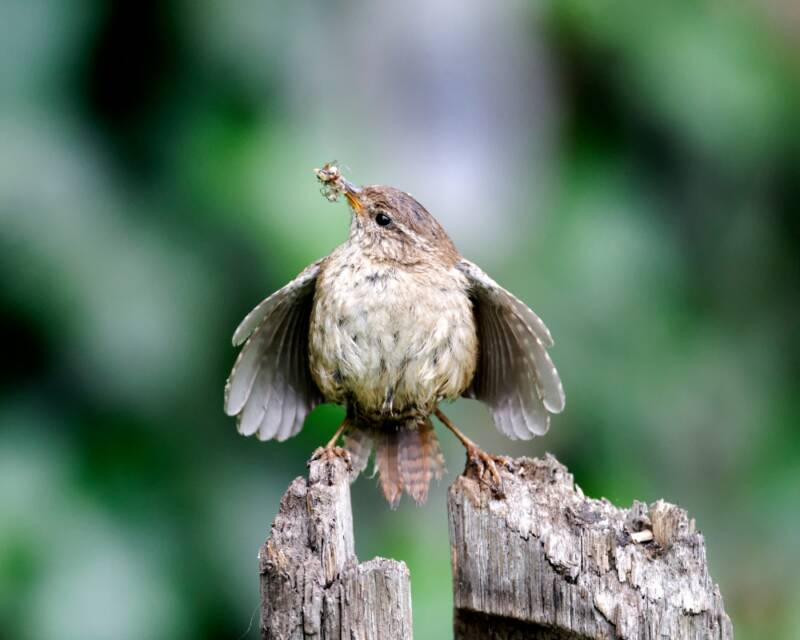
Wrens are small brown birds that are members of the “wren” family of songbirds, which includes the Carolina Wren, Thrush-like wren, Eurasian wren, Cactus wren, Winter wren etc.
Wrens eat mostly insects and are particularly fond of spiders, which they are particularly good at catching.
The Carolina Wren is a common backyard bird in the South-eastern US, where backyard owners can reap the benefit of their spider removal.
To attract the Carolina wren to your garden, you may set up a bird feeder and make sure to have mealworms, peanuts, or suet ready!
Do Blue Jays eat spiders?
The Jays, including the Stellar’s Jay and Gray Jay etc., belong to the same family of corvids as the ravens and crows do. As the corvids are omnivores, they tend to eat just about anything including spiders.
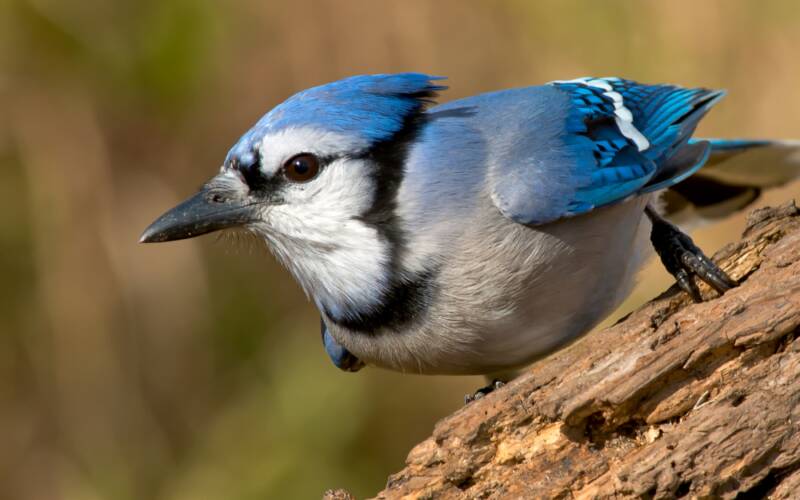
Because the Blue Jay is a relatively small bird of around 80g, it does not take on the biggest spiders, but has been observed to ingest rather substantial exemplars!
Due to their high abundance in American backyards, attracting Blue Jays is a good option for spider control.
How do you attract spider-eating birds to your backyard?
The best way to attract birds to your yard is to make it an attractive environment for them. For many of the smaller birds, like finches, robins, and sparrows, this means planting shrubs and brush that they can use to build nests and making sure there is plenty of nesting material around.
To attract larger birds, such as ravens, hawks, and owls, a yard with trees is ideal so that they can build their nests quite high up.
Another great way to attract the smaller garden birds that eat spiders is to set up a bird feeder. I won’t go too much into detail about what kind of bird feeder or what seeds/feed to place in it, as I have already written numerous posts (in fact, one for each state in the US!).
Conclusions
As all insects, spiders are a great source of protein for our feathered friends, and they are somewhat easier to catch than many smaller flying insects.
Therefore, most birds with a broad omni- and insectivorous diet, will most often also indulge in spiders. If you’re interested, I also wrote a post on the diets of crows and another one on the diet of magpies, which are also two birds that eat spiders!
Interested in backyard birds?
Do you know what backyard birds are in your state and how they compare to other states?
Then check out my other blog posts below:
- Backyard birds of Alabama
- Backyard birds of Colorado
- Backyard birds of Delaware
- Backyard birds of Georgia
- Backyard birds of Hawaii
- Backyard birds of Illinois
- Backyard birds of Iowa
- Backyard birds of Kentucky
- Backyard birds of Louisiana
- Backyard birds of Maryland
- Backyard birds of Massachusetts
- Backyard birds of Missouri
- Backyard birds of Nebraska
- Backyard birds of New York
- Backyard birds of North Carolina
- Backyard birds of Oklahoma
- Backyard birds of Rhode Island
- Backyard birds of South Carolina
- Backyard birds of Tennessee
- Backyard birds of Texas
- Backyard birds of Virginia
- Backyard birds of West Virginia
- Backyard birds of Wisconsin
- Backyard birds of Wyoming
Or in Canada:

